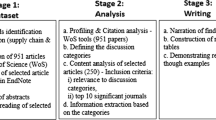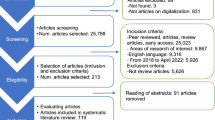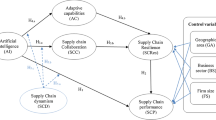Abstract
The supply chain disruptions caused primarily by the COVID-19 pandemic catastrophe are expected to prolong the global chip shortage for several more years, making it a pressing concern across industries worldwide. Nonetheless, the influence of supply chain disruptions on firm performance within the semiconductor industry, especially in developing countries like Malaysia, has received limited attention in previous studies. This study aims to determine how supply chain adaptive techniques that combine robustness, agility, and resilience during the COVID-19 pandemic affected multinational firms' performance in the semiconductor industry in Malaysia. The nature of the study is quantitative, using survey methodology. The data were collected from 82 multinational corporations of semiconductor firms through an online platform. The findings show that resilience in supply chain adaptive strategies significantly impacted multinational corporations' semiconductor industries during the COVID-19 pandemic. However, the success of semiconductor firms during the COVID-19 pandemic was not greatly affected by the resilience and agility of supply chain adaptive strategies. The findings offer valuable insights into how firms implemented supply chain adaptive strategies during the challenging times of the COVID-19 pandemic. The knowledge can enable them to lessen the effect of the COVID-19 pandemic supply chain disruption and eventually enhance the firm's performance. Future studies should examine the new aspect of supply chain strategies, such as demand-driven planning, which uses technological tools for climate adaptation in times of crisis.



Similar content being viewed by others
References
Aavenir. (2022). Supply chain resilience. Aavenir.Com. Retrieved July 11, 2022, from https://aavenir.com/glossary/supply-chain-resilience/
Advisen Insurance Intelligent (2013). The Vulnerability of Global Supply Chains: The Importance of Resiliency in the Face of Systemic Risk. Retrieved from https://www.advisenltd.com/wp-content/uploads/global-supply-chain-vulnerability-aig-2013-09.pdf
Al-Matari, E. M., Al-Swidi, A. K., & Fadzil, F. H. B. (2014). The measurements of firm performance’s dimensions. Asian Journal of Finance & Accounting, 6(1), 24. https://doi.org/10.5296/ajfa.v6i1.4761
Australian Government (2022, April 11). Funding to invest in capabilities to address supply chain vulnerabilities. Business.Gov.Au. Retrieved July 11, 2022, from https://business.gov.au/grants-and-programs/supply-chain-resilience-initiative-round-2#:~:text=The%20Supply%20Chain%20Resilience%20Initiative%20provides%20businesses%20up,input%20identified%20in%20the%20Sovereign%20Manufacturing%20Capability%20Plan.
Attinasi, M. G., Balatti, M., Mancini, M., & Metelli, L. (2021). Supply chain disruptions and the effects on the global economy. European Central Bank. Retrieved July 13, 2022, from https://www.ecb.europa.eu/pub/economic-bulletin/focus/2022/html/ecb.ebbox202108_01~e8ceebe51f.en.html
Bernabei, M., Colabianchi, S., & Costantino, F. (2022). Actions and strategies for coronavirus to ensure supply chain resilience: A systemic review. Sustainability, 14(20), 13243.
Bø, E., Hovi, I. B., & Pinchasik, D. R. (2023). COVID-19 disruptions and Norwegian food and pharmaceutical supply chains: Insights into supply chain risk management, resilience, and reliability. Sustainable Futures, 5, 100102.
Butt, A. S. (2021). Strategies to mitigate the impact of COVID-19 on supply chain disruptions: a multiple case analysis of buyers and distributors. The International Journal of Logistics Management. https://doi.org/10.1108/ijlm-11-2020-0455
Chapman, P., Christopher, M., Jüttner, U., Peck, H., & Wilding, R. (2002). Identifying and managing supply chain vulnerability. Logistics and Transport Focus, 4(4).
Chin, W. W. (2009). How to write up and report PLS analyses. Handbook of partial least squares: Concepts, methods and applications (pp. 655–690). Springer.
Chunsheng, L., Wong, C. W. Y., Yang, C.-C., Shang, K.-C., & Lirn, T. (2020). Value of supply chain resilience: Roles of culture, flexibility, and integration. International Journal of Physical Distribution & Logistics Management, 50(1), 80–100. https://doi.org/10.1108/IJPDLM-02-2019-0041
Civelek, M. E. (2020). The effects of trust and capability in supply chain on firm performance through supply chain agility and collaborative advantage. Journal of Business Research Turk, 12(1), 440–453. https://doi.org/10.20491/isarder.2020.854
Cutter, S. (2014). Building disaster resilience: steps toward sustainability. Challenges in Sustainability, 1(2), 72–79. https://doi.org/10.12924/cis2014.01020072
Derissen, S., Quaas, M. F., & Baumgartner, S. (2011). The relationship between resilience and sustainability of ecological-economic systems. Ecological Economics, 70(6), 1121–1128.
Diaz, S. (2021, September 20). What is supply chain resiliency? IBM.Com. Retrieved July 13, 2022, from https://www.ibm.com/blogs/supply-chain/what-is-supply-chain-resiliency/
Dube, N., Li, Q., Selviaridis, K., & Jahre, M. (2022). One crisis, different paths to supply resilience: The case of ventilator procurement for the COVID-19 pandemic. Journal of Purchasing and Supply Management, 28(5), 100773.
Dwivedi, A., Agrawal, D., Jha, A., Gastaldi, M., Paul, S. K., & D’Adamo, I. (2021). Addressing the challenges to sustainable initiatives in value chain flexibility: Implications for sustainable development goals. Global Journal of Flexible Systems Management, 22, 179–197.
Ferrari, A. A., Bogner, K., Palacio, V., Crisostomo, D., Seeber, N., & Ebersberger, B. (2023). The COVID-19 pandemic as a window of opportunity for more sustainable and circular supply chains. Cleaner Logistics and Supply Chain, 7, 100101.
Fioramonti, J. (2021, August 11). Covid-19’s Impact on the Semiconductor Industry. Kidder.Com. Retrieved July 12, 2021, from https://kidder.com/trend-articles/covid-19s
Fornell, C., & Larcker, D. F. (1981). Evaluating structural equation models with unobservable variables and measurement error. Journal of Marketing Research, 18(1), 39–50.
Foroozesh, N., Karimi, B., Mousavi, S. M., & Mojtahedi, M. (2023). A hybrid decision-making method using robust programming and interval-valued fuzzy sets for sustainable-resilient supply chain network design considering circular economy and technology levels. Journal of Industrial Information Integration, 33, 100440.
Frieske, B., & Stieler, S. (2022). The “Semiconductor crisis” as a result of the COVID-19 pandemic and impacts on the automotive industry and its supply chains. World Electric Vehicle Journal, 13(10), 189.
Geisser, S. (1975). The predictive sample reuse method with applications. Journal of the American Statistical Association, 70(350), 320–328.
Genovese, A., Acquaye, A., Figueroa, A., & Koh, S. C. (2017). Sustainable supply chain management and the transition towards a circular economy: Evidence and some applications. Omega, 66, 344–357. https://doi.org/10.1016/j.omega.2015.05.015
Groushko, P. (2020, May 18). Top tips to build a robust supply chain. SupplyChianDigital.Com. Retrieved July 15, 2022, from https://supplychaindigital.com/digital-supply-chain/top-tips-build-robust-supply-chain
Hair, J. F., Risher, J. J., Sarstedt, M., & Ringle, C. M. (2019). When to use and how to report the results of PLS-SEM. European Business Review, 31(1), 2–24.
Handscomb, C., Mahadevan, D., Naidoo, E., Srinivasan, S., Schor, L., & Sieberer, M. (2020, June 25). An operating model for the next normal: Lessons from agile organizations in the crisis. McKinsey & Company. Retrieved July 13, 2020, from https://www.mckinsey.com/business-functions/people-and-organizational-performance/our-insights/an-operating-model-for-the-next-normal-lessons-from-agile-organizations-in-the-crisis
Hasan, F., Bellenstedt, M. F. R., & Islam, M. R. (2023). Demand and supply disruptions during the Covid-19 crisis on firm productivity. Global Journal of Flexible Systems Management, 24(1), 87–105.
Henseler, J., Ringle, C. M., & Sarstedt, M. (2015). A new criterion for assessing discriminant validity in variance-based structural equation modeling. Journal of the Academy of Marketing Science, 43, 115–135.
Hermes. (2020). Supply Chain Agility: Strategic Adaptability within SCM. Hermes Supply Chain Blog. Retrieved from from https://en.hermes-supply-chain-blog.com/supply-chain-agility-scm/#:~:text=Agility%20describes%20the%20ability%20of%20a%20system%20to,adapt%20to%20the%20volatility%20of%20the%20economic%20environment.
Ikram, M., & Sayagh, Y. (2023). The consequences of COVID-19 disruption on sustainable economy in the top 30 high-tech innovative countries. Global Journal of Flexible Systems Management, 24(2), 247–269.
Insightsoftware. (2021, January 8). 35 Best Operational KPIs and Metric Examples for 2021 Reporting. Insightsoftware.Com. Retrieved July 13, 2022, from https://insightsoftware.com/blog/35-operational-kpis-and-metric-examples/#:~:text=An%20Operations%20Key%20Performance%20Indicator%20%28KPI%29%20or%20metric,are%20effective%2C%20and%20those%20that%20inhibit%20the%20company.
Ivanov, D. (2021). Supply chain viability and the COVID-19 pandemic: A conceptual and formal generalisation of four major adaptation strategies. International Journal of Production Research, 59(12), 3535–3552.
Jadoul, Q., Nascimento, A., Salo, O., & Willi, R. (2020, November 18). Agility in the time of Covid-19: Changing your operating model in an age of turbulence. Mckinsey & Company. Retrieved July 13, 2022, from https://www.mckinsey.com/business-functions/people-and-organizational-performance/our-insights/agility-in-the-time-of-covid-19-changing-your-operating-model-in-an-age-of-turbulence
Javaid, S. (2022, May 30). Top 4 Ways to Improve Supply Chain Resilience in 2022. AIMultiple.Com. Retrieved July 11, 2022, from https://research.aimultiple.com/supply-chain-resilience/
Juan, S. J., Li, E. Y., & Hung, W. H. (2021). An integrated model of supply chain resilience and its impact on supply chain performance under disruption. The International Journal of Logistics Management, 33(1), 339–364. https://doi.org/10.1108/ijlm-03-2021-0174
Junior, C. A. R., Sanseverino, E. R., Gallo, P., Koch, D., Kotak, Y., Schweiger, H. G., & Zanin, H. (2023). Towards a business model for second-life batteries–barriers, opportunities, uncertainties, and technologies. Journal of Energy Chemistry, 78, 507–525.
Kyung Mo Kang, G. (2022). Implications from a reshaping of the semiconductor supply chain. Eastspring.Com. Retrieved July 11, 2022, from https://www.eastspring.com/insights/thought-leadership/implications-from-a-reshaping-of-the-semiconductor-supply-chain
Khanuja, A., & Jain, R. K. (2021). The conceptual framework on integrated flexibility: an evolution to data-driven supply chain management. The TQM Journal, 35(1), 131–152. https://doi.org/10.1108/tqm-03-2020-0045
Lebel, L., Anderies, J. M., Campbell, B., Folke, C., Hatfield-Dodds, S., Hughes, T. P., & Wilson, J. (2006). Governance and the capacity to manage resilience in regional social-ecological systems. Ecology and Society, 11(1), 19. https://doi.org/10.5751/ES-01606-110119
Loka, R., Parimi, A. M., Srinivas, S. T. P., & Kumar, N. M. (2023). Leveraging blockchain technology for resilient and robust frequency control in a renewable-based hybrid power system with hydrogen and battery storage integration. Energy Conversion and Management, 283, 116888.
Magableh, G. M. (2021). Supply chains and the COVID-19 pandemic: A comprehensive framework. European Management Review, 18(3), 363–382.
Malaysia Investment Development Authority. (2022, May 30). Semiconductor supply chain needs to be more resilient, flexible, says Azmin. www.Mida.Gov.My. Retrieved July 13, 2022, from https://www.mida.gov.my/mida-news/semiconductor-supply-chain-needs-to-be-more-resilient-flexible-says-azmin/
Millar, M. (2019). Supply Chain Disruption Impacts Cost, Quality and Risk. Brink News. Retrieved January 2, 2022, from https://www.brinknews.com/supply-chain-disruption-improves-cost-quality-and-risk/
Miroudot, S. (2020). Resilience versus robustness in global value chains. VOX, CEPR Policy Portal. Retrieved December 11, 2021, from https://voxeu.org/article/resilience-versus-robustness-global-value-chains
Monostori, J. (2018). Supply chains robustness: Challenges and opportunities. Procedia CIRP, 67, 110–115. https://doi.org/10.1016/j.procir.2017.12.185
News Wire. (2021, May 12). The global chip shortage could last until 2023. Naija247News. Retrieved July 6, 2022, from https://naija247news.com/2021/05/12/the-global-chip-shortage-could-last-until-2023/#:~:text=Glenn%20O%E2%80%99Donnell%2C%20a%20vice%20president%20research%20director%20at,and%20into%202023%2C%E2%80%9D%20he%20wrote%20in%20a%20blog.
Privitera, G. J. (2012). Introduction to hypothesis testing. In Statistics for the behavioral sciences (pp. 1–38). SAGE publications.
Ramani, V., Ghosh, D., & Sodhi, M. S. (2022). Understanding systemic disruption from the Covid-19-induced semiconductor shortage for the auto industry. Omega, 113, 102720.
Rose, A. (2011). Resilience and sustainability in the face of disasters. Environmental Innovation and Societal Transitions, 1(1), 96–100. https://doi.org/10.1016/j.eist.2011.04.003
Salehi, S., Mehrjerdi, Y. Z., Sadegheih, A., & Hosseini-Nasab, H. (2022). Designing a resilient and sustainable biomass supply chain network through the optimization approach under uncertainty and the disruption. Journal of Cleaner Production, 359, 131741.
SAP Insights. (2022). What is a resilient supply chain? SAP.Com. Retrieved from https://www.sap.com/insights/what-is-a-resilient-supply-chain.html#:~:text=A%20resilient%20supply%20chain%20is%20defined%20by%20its,can%20threaten%20multiple%20areas%20of%20the%20supply%20chain.
Sassanelli, C., & Terzi, S. (2022). The D-BEST reference model: A flexible and sustainable support for the digital transformation of small and medium enterprises. Global Journal of Flexible Systems Management, 23(3), 345–370.
Sekaran, U., & Bougie, R. (2016). Research methods for business: A skill building approach. Wiley.
Semiconductor Industry Association. (2021). Global Semiconductor Sales Increase by 6.5% to $439 billion in 2020. Retrieved July 10, 2022, from https://www.semiconductors.org/global-semiconductor-sales-increase-6-5-to-439-billion-in-2020/#:%7E:text=Global%20Semiconductor%20Sales%20Increase%206.5%25%20to%20%24439%20billion%20in%202020,-Monday%2C%20Feb%2001&text=WASHINGTON%E2%80%94Feb.,2019%20total%20of%20%24412.3%20billion.
Shaharudin, M. R., Zailani, S., & Ismail, M. (2015). Third-party logistics strategic orientation towards the reverse logistics service offerings. International Journal of Management Practice, 8(4), 356–374.
Shaharudin, M. R., Zailani, S., Tan, K. C., Cross, J., & Hotrawaisaya, C. (2023). Fostering closed-loop supply chain orientation by leveraging strategic green capabilities for circular economy performance: Empirical evidence from Malaysian electrical and electronics manufacturing firms. Environment, Development and Sustainability,. https://doi.org/10.1007/s10668-022-02832-3
Sharma, et al. (2021). Accelerating retail supply chain performance against pandemic disruption: Adopting resilient strategies to mitigate the long-term effects. Journal of Enterprise Information Management, 34(6), 1844–1873. https://doi.org/10.1108/jeim-07-2020-0286
Shiftboard (2021). Strategies to overcome labor shortage challenges in manufacturing. www.Shiftboard.Com. Retrieved July 11, 2022, from https://www.shiftboard.com/strategies-to-overcome-labor-shortage-challenges-in-manufacturing/
Simonetto, M., Sgarbossa, F., Battini, D., & Govindan, K. (2022). Closed loop supply chains 40 From risks to benefts through advanced technologies A literature review and research agenda. International Journal of Production Economics, 253, 108582.
Stone, M. (1974). Cross-validatory choice and assessment of statistical predictions. Journal of the Royal Statistical Society: Series B (methodological), 36(2), 111–133.
Sturm, S., et al. (2021). Empirical research on the relationships between demand- and supply-side risk management practices and their impact on business performance. Supply Chain Management, 27(6), 742–761. https://doi.org/10.1108/scm-08-2020-0403
Sushil. (2011). Flexibility, vitality and sustainability. Global Journal of Flexible Systems Management, 12(1), 3.
Sushil. (2015). Valuation of flexibility. Global Journal of Flexible Systems Management, 16(3), 219–220. https://doi.org/10.1007/s40171-015-0100-6
Tang, C. S. (2006). Robust strategies for mitigating supply chain disruptions. International Journal of Logistics: Research and Applications, 9(1), 33–45.
The edge markets (2020). Local semiconductor industry changes game plan as playing field shifts due to geopolitics, Covid-19. The Edge Markets. Retrieved from https://www.theedgemarkets.com/article/local-semiconductor-industry-changes-game-plan-playing-field-shifts-due-geopolitics-covid19#
The Star (2021). Digital technologies and infrastructure driving positive digital investment momentum. Retrieved April 18, 2023, from https://www.thestar.com.my/business/business-news/2021/03/22/digital-technologies-and-infrastructure-driving-positive-digital-investment-momentum
Todo et al. (2021). Robustness and resilience of supply chains during the Covid-19 Pandemic: Findings from a questionnaire survey on the supply chain links of firms in ASEAN and India. ERIA Discussion Paper Series. https://www.eria.org/uploads/media/discussion-papers/FY21/Robustness-and-Resilience-of-Supply-Chains-During-the-Covid-19-Pandemic.pdf
UNIDO (2020). Impact assessment of COVID-19 on malaysia’s manufacturing firms; United Nations Industrial Development Organization: Vienna, Austria. Retrieved from https://www.unido.org/sites/default/files/files/2021-03/UNIDO%20COVID19%20Assessment_Malaysia_FINAL.pdf
Vedantu. (2022). Modern organizational theories–Contingency Theory. Vedantu.Com. Retrieved July 13, 2022, from https://www.vedantu.com/commerce/modern-organizational-theories-contingency-theory
Vinney, C. (2021). Likert scale: What is it and how to use it? ThoughtCo. Retrieved from https://www.thoughtco.com/likert-scale-4685788.
Wadhwa, S., & Rao, K. S. (2004). A unified framework for manufacturing and supply chain flexibility. Global Journal of Flexible Systems Management, 5(1), 29–36.
Wetzels, M., Odekerken-Schroder, G., & van Oppen, C. (2009). Using PLS path modeling for assessing hierarchical construct models: Guidelines and empirical illustration. MIS Quarterly, 33(1), 177–195.
Wided, R. (2023). IT capabilities, strategic flexibility and organizational resilience in SMEs post-COVID-19: A mediating and moderating role of big data analytics capabilities. Global Journal of Flexible Systems Management, 24(1), 123–142.
Wulandhari, N. B. I., Budhwar, P., Mishra, N., Akbar, S., Do, Q., & Milligan, G. (2023). Organizational resilience to supply chain risks during the COVID-19 pandemic. British Journal of Management. https://doi.org/10.1111/1467-8551.12648
Zailani, S., Govindan, K., Iranmanesh, M., Shaharudin, M. R., & Chong, Y. S. (2015). Green innovation adoption in automotive supply chain: The Malaysian case. Journal of Cleaner Production, 108, 1115–1122.
Funding
Not Applicable.
Author information
Authors and Affiliations
Corresponding author
Ethics declarations
Conflict of interest
The authors declare that they do not have any known competing financial interests or personal relationships that could appear to have influenced the work reported in this paper.
Ethical Approval
The ethical approval for this study was granted by the Branch Ethics Research Committee (BERC) at Universiti Teknologi MARA, Pulau Pinang Branch, Malaysia. Informed consent was obtained from all participants involved in the study, and their privacy and confidentiality were strictly maintained. Any personal information collected during the research was anonymized and stored securely.
Additional information
Publisher's Note
Springer Nature remains neutral with regard to jurisdictional claims in published maps and institutional affiliations.
Appendix
Appendix
Measurement Items
Firm performance: Likert scale, 1 = Strongly disagree, 5 = Strongly agree | |
|---|---|
Code | Item |
FP1 | Our organization reported steady sales growth during the COVID-19 pandemic crisis |
FP2 | Our organization achieved profitability growth targets during the COVID-19 pandemic crisis |
FP3 | Our organization increased its competitive market share during the COVID-19 pandemic crisis |
FP4 | Our organization maintains a strong and positive long-term relationship with its customers during the COVID-19 pandemic crisis |
FP5 | Our manufacturing and delivery lead-time have increased during the COVID-19 pandemic crisis |
Supply chain robustness strategy: Likert scale, 1 = Strongly Disagree, 5 = Strongly Agree | |
|---|---|
Code | Item |
ASRO1 | Our organization has written actions to handle the communication, business process, and recovery plan during a crisis |
ASRO2 | Our organization has a robust strategy to manage regular fluctuations efficiently under normal circumstances or major disruptions |
ASRO3 | Our organization has a regular schedule to review the change control management of all business continuity plan components |
ASRO4 | Our organization can return to operations quickly if a major crisis occurs and interrupts our supply chain |
ASRO5 | Our organization ensures the core processes quickly resume following a system failure/disruptions recovery plan |
Supply chain agility strategy: Likert scale, 1 = Strongly Disagree, 5 = Strongly Agree | |
|---|---|
Code | Item |
ASAG1 | Our suppliers quickly share relevant information with our organization |
ASAG2 | Our organization can generate the required data quickly in decisions making process |
ASAG3 | Our organization has processes in place that allow for quick decision-making |
ASAG4 | Our organization can implement the changes in supply quickly once decisions have been made |
ASAG5 | Our suppliers can support our increasing demand |
Supply chain resilience strategy: Likert scale, 1 = Strongly Disagree, 5 = Strongly Agree | |
|---|---|
Code | Item |
ASRE1 | Our organization can recover quickly without impacting customer delivery |
ASRE2 | Our organization always has multiple sourcing options |
ASRE3 | Our organization has a high level of agility to increase or decrease production |
ASRE4 | Our organization has better visibility into the supply chain to make decisions faster |
ASRE5 | Our organization ensures it always has competitive pricing |
ASRE6 | Our organization ensures it has the financial viability of all key suppliers |
Rights and permissions
Springer Nature or its licensor (e.g. a society or other partner) holds exclusive rights to this article under a publishing agreement with the author(s) or other rightsholder(s); author self-archiving of the accepted manuscript version of this article is solely governed by the terms of such publishing agreement and applicable law.
About this article
Cite this article
Ishak, S., Shaharudin, M.R., Salim, N.A.M. et al. The Effect of Supply Chain Adaptive Strategies During the COVID-19 Pandemic on Firm Performance in Malaysia's Semiconductor Industries. Glob J Flex Syst Manag 24, 439–458 (2023). https://doi.org/10.1007/s40171-023-00347-y
Received:
Accepted:
Published:
Issue Date:
DOI: https://doi.org/10.1007/s40171-023-00347-y




